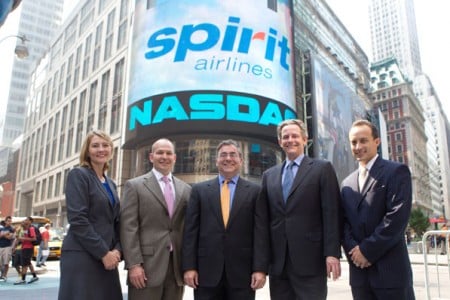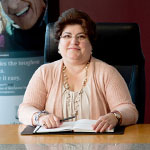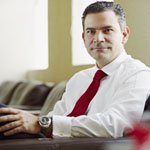Just ask Orville and Wilbur Wright: aviation is all about numbers. There’s velocity, mass, and momentum, for instance; wind speed and wingspan; not to mention distance and duration of flight. Because a commercial aircraft can’t fly without an airline, there’s also numbers like fuel cost per gallon, load factor, cost per available seat mile, and revenue per passenger, just to name a few. Modern flight, therefore, demands not only engineers, but also accountants. Enter Miami-based Edmundo “Ed” Miranda. As vice president and corporate controller for ultra-low-fare carrier Spirit Airlines, Inc., which operates more than 200 daily flights to more than 50 destinations, he does for the company’s coffers what its pilots do for passengers: he steers, navigates, and protects.

I was born in Granada, Nicaragua. I immigrated to the United States with my parents when I was three years old to escape the Sandinista regime. We moved to Miami, where we lived for about eight years, then moved to Ohio.
During high school I made up my mind to join the military. I wanted to give back to this great country that had taken my family in and provided me with so much opportunity. After my freshman year in college, I signed up for the Army Reserve. I spent that entire summer in basic training and later in my assigned job training in Fort Leonard Wood, Missouri. That experience helped me gain self-confidence. I learned the importance of hard work, loyalty, selfless service, honor, and integrity. I learned how to be a good soldier and, in turn, how to be a good worker. I saw what makes a good leader and the importance of leading by example.
I wanted to become a scientist. I remember watching the National Geographic channel with my dad when I was young. I wanted to be a discoverer like Jacques Cousteau, sailing all over the world, seeing animals in the wild and having adventures. When I started college I was like a lot of students: undecided. I knew I liked chemistry, so I took a few classes towards a biology or chemistry major, but it wasn’t long before I realized that it wasn’t for me.

I have always looked up to my dad. He is one of the smartest people I know. So when he gave me advice, I listened. My dad thought I would be a good accountant because he knew I enjoyed math and figuring things out. My dad always told me that a great education is like a machete—you have to keep it sharp. The sharper and stronger it is, the easier you can get through the jungle of life. Becoming licensed in a field where others are not—obtaining that which is difficult—improves your chances of success. “Get yourself a good education, study hard, become a CPA,” my dad said, “and you will have one hell of a great machete.”
When I was a kid I used to love trying to fix things, like tape recorders, electric motors—any gadget, really. It didn’t even have to be broken. I would take it apart just to learn how it worked. Being an auditor or an accountant is similar in many ways. You first have to understand the mechanics of the transaction. You have to be able to understand it and explain it in simple terms. Then you can apply the general accounting concepts you learned in school to determine the most appropriate way to recognize the transaction.
I interviewed with Spirit Airlines and was hired as director of accounting in 2007. I played a key role in Spirit’s initial public offering by drafting the company’s S1 registration statement. I also helped build a good finance team—a great team, in fact. One of the best. We have one motto: whatever it takes. If that means working through the night, coming in during the weekends, going to the warehouse in the heat to help count inventory parts … we get it done, whatever it takes.
We enjoy our jobs and we like to have fun. We try to have at least one happy hour or event a quarter—either a bowling event, a paintball fight, or a late lunch and happy hour at Gulfstream Park. Sometimes it is good to let loose. I feel it is important to let people know they matter and that they are doing a good job.
Accounting and finance are very important to the airline industry. There are dozens of financial measurements that are used by management to make decisions and by investors to decide whether or not to invest. All of these numbers are calculated, tracked, and analyzed by the accounting and finance department. An airline without accurate financial information is like a pilot who can’t see where he’s going. Just like a jet airliner moving at 500 miles per hour, things come up really quickly. An airline company is capital-intensive. We are moving very fast and a bad decision can cost us a lot. Having the best and most accurate information available in a timely manner to make the best decision possible can mean the difference between net income and net loss.
We never forget that we are ultra-low cost. We think about it every time we take out our own trash to save money on housekeeping. The challenge is, everything seems to be getting more expensive. There is a constant struggle to keep costs low. The opportunity is that we can offer lower fares than our competitors and still make a profit.
I’m where I’m at not because I got lucky, but because I was offered opportunities in life and was able to take advantage of them. I was prepared. It pays to take the road less traveled. When you are at work, you have to take ownership in and responsibility of your work product. Have a good attitude; nobody wants to work with a grouch. Be able to adapt. Things change every day.
I need to be challenged. I would like to keep learning more about the airline industry and to gain more treasury and FP&A experience so that one day I can become an effective CFO. That’s my next goal.

You have to have a good overall balance. I like classic rock and there’s a Who song that says: “too much of anything is too much for me.” What that means to me is that it’s good to work out, it’s good to work hard, it’s good to party and have a good time—but everything should be taken in moderation, and nothing neglected.

